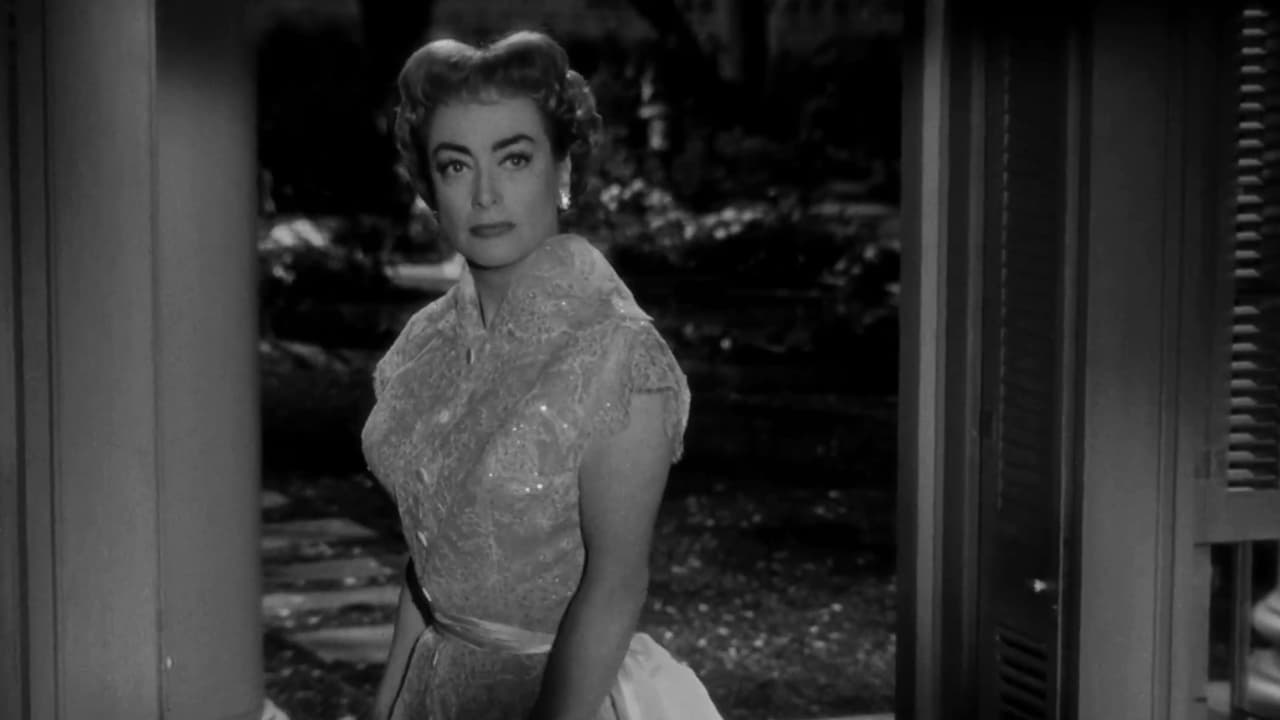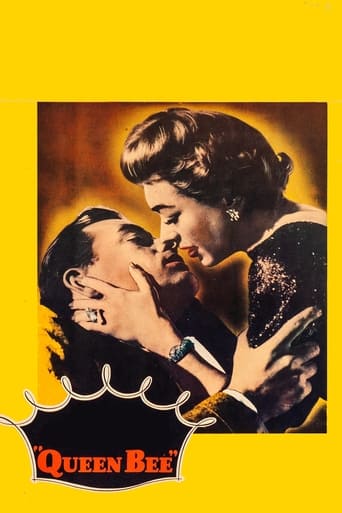

Brilliant and touching
... View MoreA Brilliant Conflict
... View MoreIt’s not bad or unwatchable but despite the amplitude of the spectacle, the end result is underwhelming.
... View MoreThere is, somehow, an interesting story here, as well as some good acting. There are also some good scenes
... View MoreThis ultra-glossy melodrama, directed with surprising style and flair by MacDougall, plus superbly photographed and set, adds up to a marvelous showcase for Joan Crawford. She's given a great lead-up entrance and then makes the most of her every scene. And she's handed a great support cast to bounce her charisma off. Even squinty-eyed Lucy Marlow looks attractive in her Jean Louis costumes. Sullivan, Ireland, Betsy Palmer, Fay Wray (in a small role right at the beginning) are most deft and convincing. But it is Crawford's film. Such style, such elegance, such glossiness. Yes, with Queen Bee we are back in familiar Joan Crawford territory - one of those heated Southern melodramas played with all stops out by Miss C in settings of tasteful luxury. It's all very much a woman's picture and despite the fact that it's based on a novel, it's also very much a stage affair with most of the action taking place on and around the giant central staircase set that is often even more stunningly lit than Miss C herself. The direction has what you might call an elegant style and the director allows Miss C to dominate the action, giving her an effective entrance and several scenes which she can play in the grand manner as she lectures Lucy Marlow (whose face is almost invariably in shadow). Miss M is obviously an inexperienced actress and is unflatteringly photographed to boot. John Ireland is also not photographed attractively, whilst Barry Sullivan is forced to go through the film with an ugly scar on his face (though he is the only one allowed to match Miss C in the histrionic dept). Fay Wray has a tiny role that is confined to one scene. Photography is glossy and the production slick, though production values are no more than average by "A" standards.
... View MoreThis is a melodrama and is obviously written for one reason and that is to be a melodrama. The result is a one-dimensional and at times seemingly slow film as scenes of pure melodrama follow one after the other. Joan Crawford was the master of the genre and she is terrific in this one, even getting intimidatingly physical at times, and shockingly so. You gotta see these scenes as she goes completely over the top, they are priceless.It all takes place in one house, with the characters constantly interacting in close quarters, as if scorpions in a bottle. This really doesn't work as well as it should because the characters have little or no development and in some cases no background. For example, all we really know about Crawford's character is that she came from Chicago and she is meaner than hell. Fortunately all of the acting is outstanding. Barry Sullivan gives one of his best performances, its maybe his finest ever. He is believable as Avery, the suffering husband and father of the Queen Bee's two children. The acting in "Queen Bee" is so good that it overcomes any shortcomings, making this a film I would recommend. It is one of the classic late-Crawford "eyebrow movies" and not to be missed.
... View More"Queen Bee" came out in 1955, midway through a decade when the plays of Tennessee Williams were much in vogue, both in their original theatrical form and in cinematic adaptations. It has much in common with Williams's dramas, being a story about a family riven by jealousies and hatreds and with a setting in the Deep South. The "Queen Bee" of the title is Eva Phillips, the wife of a wealthy Georgia mill owner, who has earned that nickname by the ruthless way in which she dominates her husband and her relatives. The other main characters are Eva's alcoholic husband Avery, Avery's sister Carol, Carol's fiancé (and Eva's former lover) Judson Prentiss, who works as Avery's mill manager, and Jennifer Stewart, a young cousin visiting from Chicago. Although the film was based upon a novel ("The Queen Bee" by Edna L. Lee) rather than a stage play, it was mostly (apart from the final climactic scene) made in the "filmed theatre" style, with most of the action taking place indoors and an emphasis upon dialogue rather than physical action. I said that it has much in common with Tennessee Williams, but in one department it seems sadly lacking. Williams's writing could at times be overwrought and excessively melodramatic, but he was also capable of producing some genuinely gripping and moving drama. I have never read Lee's novel (indeed, until seeing this film I had never heard of it or its author), but on the evidence of this screenplay the scriptwriter Ranald MacDougall (who also acted as director) sadly lacked Williams's dramatic talents. He keeps the melodrama and overwrought emotion, but lacks the literary skill to make anything of them. Two episodes in particular struck me as unconvincing. The first comes when Carol commits suicide after learning that Judson was once Eva's lover. MacDougall is never able to convince us that there is any reason why a healthy young woman should have done such a thing, especially as the Eva/Judson romance was over long before he became engaged to Carol (or, for that matter, before Eva married Avery. MacDougall (or perhaps Edna Lee) seems to have imagined that any decent drama needs at least one suicide to make it interesting. The other development I found hard to credit was the romance that grows up between Avery and Jennifer. It is not simply the age difference- older man/younger girl love-stories were commonplace in films of this era. It is also that Avery has hitherto been portrayed as a useless drunken layabout living off inherited money- hardly the sort of man likely to appeal to a spirited young woman like Jennifer, even if she did have a thing for married men old enough to be her father. Joan Crawford plays Eva less as Queen Bee than as Queen Bitch, the spiritual ancestor of Alexis Carrington, the character made famous by another Joan C in "Dynasty". The difference is that Joan Collins made Alexis a repellent but fascinating creature whose malevolent and ruthless amorality was offset by her seductive glamour, whereas Crawford's Eva is simply repellent without the glamour or sex appeal. She was also too old for the role. Crawford's exact age was as closely guarded as an official secret, but in 1955 she was probably in her early fifties and Eva, the mother of two children of pre-school age, is doubtless intended to be much younger. Crawford was always rather mannish in appearance, a trait exaggerated here by some rather odd make- up, and although this aspect of her appearance could seem appropriate in some of her movies, such as "Johnny Guitar" from the previous year, it makes it difficult for us to accept Eva as a sultry siren. At least Crawford, however, does make an impression of sorts, something I cannot say most of the other cast members, who all play their characters in a very one-dimensional way. The principal exception is the otherwise obscure Lucy Marlow (she only acted in about three other films) who gives a creditable performance as Jennifer. I said earlier that until seeing this film I had never heard of Edna Lee's novel. For that matter I had never heard of the film either until I caught it late at night on a TV movie channel and watched it because I had admired Crawford in some of her other offerings. Having seen it I can now understand why it ranks among the lesser-known entries in her filmography. 4/10
... View MoreIt's not that this is a bad film, but it doesn't quite work...and I'm not sure why. I just know that as I was watching it -- a story about a woman who manipulates everyone in a southern mansion -- I couldn't help thinking that Lillian Hellman could have fixed it.I can't fault the acting here. Joan Crawford is at her bitchy best. Even Barry Sullivan, whom I always thought of as a competent actor (though far from a favorite of mine), is very, very good. John Ireland does well. Betsy Palmer is excellent. Lucy Marlow as the visitor is very good. And it's interesting to see Fay Wray as the nut case in the early scenes.The basic story line seems fine -- A ruthless and unsatisfied wife at a southern mansion manipulates everyone (including the children) into a miserable life that includes multiple suicide. And you just know that in the end the witch (Crawford) will get her comeuppance...but how? But somehow, it just doesn't come together. Although the story line was fine, maybe the script was weak...or the direction. But that doesn't mean that it's not watchable. And of course, watching Crawford play a character that some say was very close to her real personality is extremely interesting.
... View More